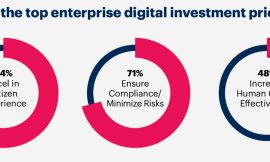Being people-centric means helping employees develop new skills and building a sense of belonging at work, according to a report from Glint and LinkedIn Learning.

Image: iStock/AndreyPopov
Managers have to do more than master soft skills like communication and teamwork, according to a new survey. The goal for 2021 and beyond is to be a people-centric leader who prioritizes belonging, learning and engagement, according to the State of the Manager 2021 report from Glint and LinkedIn Learning.
Trust was a major theme of the report, which noted this workplace dynamic can boost a sense of belonging and productivity. Matt Roddan, the director of Glint People Science, said in the report that trusted employees are productive employees.
“Organizations wedded to command-and-control comfort zones will invariably constrain their agility,” Roddan said.
Managers are in the best position to help employees find balance, support and success, according to the report, more so than senior leaders. Part of the research included a survey of 2,000 employees and one question was about where managers are most influential. Survey respondents said that these areas are where managers can help team members the most:
- Developing professionally
- Balancing work and personal life
- Successfully completing work projects
- Being connected to the right people at work
- Feeling a sense of belonging
SEE: COVID-19 workplace policy (TechRepublic Premium)
Another important change, according to the report, is for managers and other leaders to be deliberate about networking beyond the leadership team: “Leaders who step outside of their bubbles will broaden their opportunities to form relationships with a wider range of people, opening up a more equitable path for stretch assignments and promotions.”
Employees also want managers to invest in training for new skills with 91% of employees saying it’s very important for managers to encourage learning and experimentation. The report found that employees who see good opportunities to learn and grow are 2.9 times more likely to be engaged at work. Employees want to acquire new skills and companies are beginning to understand that reskilling and upskilling can be a competitive advantage, according to the report.
The report offers this advice for managers who want to adapt to the new challenges of a mostly remote workforce:
- Prioritize learning for staff members
- Expand soft skills
- Build trust within the organization to increase autonomy
- Listen to feedback from peers and especially direct reports
- Grow professional networks beyond the traditional bubble
Here are recommendations from the report about how to develop these abilities.
Building the skills to manage a remote workforce
According to experts at LinkedIn Learning, these are the most important skills for managers to build and maintain:
- Resilience and adaptability
- Technology skills and digital fluency
- Communication across remote or distributed teams
- Emotional intelligence
- Cross-functional collaboration
There are few things that companies can do to help managers practice these skills and become more people-centric.
The first is to coach managers about how to have meaningful conversations. One-on-one meetings are just as important as group calls. During these talks, it’s easy to skip over sensitive subjects or difficult conversations to focus on daily operations instead. Companies should train managers on how to broach these subjects and explain how these conversations can help with “work-life balance as well as supporting growth, career development and well-being.”
Another stretch goal for managers is learning to hear feedback from multiple sources, including direct reports. As a person moves up within a company and gains more power, he or she doesn’t get as much feedback because “peers, coworkers and especially direct reports start to think twice before providing candid input.”
At the same time, the report notes that honest feedback is the best way to improve management skills over time. The survey recommends that companies provide multiple channels of feedback including employee engagement surveys, feedback in the flow of work, and 360-feedback from leaders, peers and team members. Another tactic is to help managers become more self-aware and able to understand how their actions and words affect others.
Finally, the report recommends giving managers an off-ramp if the role is not a good fit. Companies should l “find human ways for people to pivot to different roles.” Stacia Sherman Garr, co-founder and principal analyst at RedThread Research, said in the report that 2020 provided clarity for many managers about whether they’re in the right job. “Sometimes it’s about helping managers find new roles that don’t include people management,” she said.
The analysis in this report came from multiple sources, including a sample of 15 million data points collected through the Glint People Success Platform during 2020, as well as data collected through several surveys of LinkedIn members between September and December 2020. Glint platform data points were submitted through employee surveys at over 500 companies, covering a range of aspects of the employee experience. The synthesis and analysis of this data were performed in January 2021.
Also see
Source of Article




